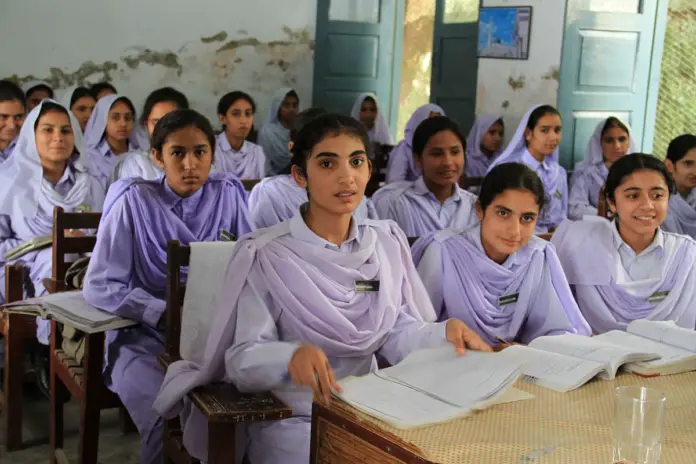Education in Pakistan is overseen jointly by the Federal Ministry of Education and provincial governments. The federal government primarily supports curriculum development, accreditation, and research and development financing. Article 25-A of the Constitution of Pakistan mandates the state to offer free and compulsory quality education to children aged 5 to 16 years. The State shall provide free and compulsory education to all children of the age of five to sixteen years in such a manner as may be determined by law.
Education is widely recognized as a crucial factor in achieving socio-economic prosperity worldwide. The efficacy of education hinges on a country’s educational policies, with nations boasting robust policies and sustained funding more adept at realizing socio-economic development. In contrast, despite numerous educational policies, Pakistan has yet to attain significant milestones in socio-economic development. This failure can be attributed to partial or complete breakdowns in policy implementation, compounded by factors such as political and bureaucratic reluctance, economic weakness, inconsistency in policy execution, clashes of political ideologies, conflicts, regime changes, and pervasive corruption. To pave the way for economic and social progress, Pakistan must establish a unified educational policy and ensure the presence of qualified personnel to effectively deliver the curriculum in either local or national languages for enhanced conceptual understanding. Moreover, a critical step lies in allocating a minimum of 4% of the GDP for education, accompanied by a resolute commitment from bureaucracy and political leadership to maintain consistency in funding. Without these measures, the vision of achieving social and economic advancement may remain an elusive dream rather than a tangible reality.
The 2023 Pakistani Education Policy is an extensive document that charts the course for the education system in Pakistan. Its primary objective is to ensure that education is accessible, inclusive, and of superior quality for all individuals. Notable modifications within the policy comprise heightened attention to early childhood education, a curriculum overhaul to align with contemporary societal requirements, and a dedicated emphasis on digital literacy.
The ongoing problem of stagnant educational standards in Pakistan is underscored despite the numerous educational policies. The primary reason cited for this lack of improvement is the significant deficiency in the design of the curriculum. The curriculum used in Pakistan is characterized as outdated and primarily focused on promoting rote memorization. Instead of encouraging critical thinking, logic, and rationality, the current curriculum prioritizes memorization-based learning methods. As a result, students are not adequately equipped with the skills necessary for analytical thinking, problem-solving, and independent reasoning. This fundamental flaw in the curriculum design is identified as a major obstacle hindering educational progress in Pakistan, as it fails to foster the development of essential cognitive abilities and intellectual capacities among students.
Another critical aspect of Pakistan’s flawed education system, which is its examination system. The examination system is described as primarily relying on memory tests. This means that the assessment of students’ knowledge and understanding is primarily based on their ability to memorize and regurgitate information, rather than on their comprehension, critical thinking skills, or practical application of knowledge.
In such a system, students are often required to memorize large amounts of information without necessarily understanding the underlying concepts or being able to critically analyze or apply the knowledge in real-world situations. This approach to examinations can lead to a superficial understanding of subjects, incentivizing rote learning over genuine learning and comprehension.
As a result, students may focus more on memorization techniques rather than developing a deep understanding of the material. This can limit their ability to think critically, solve problems creatively, and apply their knowledge in practical settings. Additionally, it can create a stressful and high-pressure environment for students, as their success is often determined by their ability to memorize information rather than demonstrate genuine understanding and competency.
The lack of emphasis on student development is a significant issue within the education system of Pakistan. Teachers at both the school and college levels often fail to prioritize the holistic growth of their students, instead focusing primarily on achieving high grades and marks. This pressure to prioritize academic performance over comprehensive development is reinforced by higher authorities, who enforce strict guidelines that emphasize grades and marks as measures of success. Consequently, the educational environment becomes heavily centered on examination results rather than nurturing students’ critical thinking skills, creativity, and personal growth. This approach not only limits the students’ potential for holistic development but also contributes to a culture of rote learning and memorization, where students prioritize memorizing information for exams rather than engaging with the material in a meaningful and comprehensive manner.
The shortcomings of the education system become ingrained in the students, hindering their development and preparedness for higher academic pursuits. The lack of emphasis on critical thinking, problem-solving, and practical skills in the earlier stages of education perpetuates into their university years, where these deficiencies become apparent once again. This cycle reflects the continuity of issues within the education system and underscores the need for reforms to address these shortcomings and better prepare students for their academic and professional endeavors.
Improving the education system requires a multifaceted approach, with curriculum redesign being a crucial first step. The current curriculum must be overhauled to incorporate advanced subjects that foster essential skills such as problem-solving, critical thinking, and interdisciplinary knowledge. This redesigned curriculum should go beyond traditional subjects and include disciplines like philosophy, law, economics, and psychology. By introducing a more diverse and comprehensive curriculum, students will be better equipped to navigate complex real-world challenges, develop analytical abilities, and broaden their intellectual horizons. Additionally, integrating these subjects into the curriculum can promote a deeper understanding of societal issues, encourage innovation and creativity, and prepare students for a rapidly changing global landscape.







